Many course creators often start their online course journey on platforms such as Kajabi. But as they grow, they quickly realize that Kajabi and similar hosted platforms (like Podia and Mighty Networks) become limiting and prevent them from taking their course to the next level.
The need for more marketing and customization options than Kajabi can offer prompts these course creators to seek other alternatives. That’s when many creators decide to switch to a self-hosted solution – hosting their courses on their own WordPress websites with an LMS plugin.
But, migration from Kajabi to a self-hosted platform can be complex and costly. Leaving Kajabi means leaving all your content behind, which means that you’re basically starting from scratch.
So, before hosting your course on Kajabi, think carefully. If you plan on growing and scaling your course to be the primary or significant part of your business, it’s better to start with your own setup from the start. However, if you plan on having your course remain a side project, Kajabi and similar hosted course platforms can work well for you.
Not sure which path to take? Good news! Check out the flowchart below to guide you in choosing the right platform for your needs.
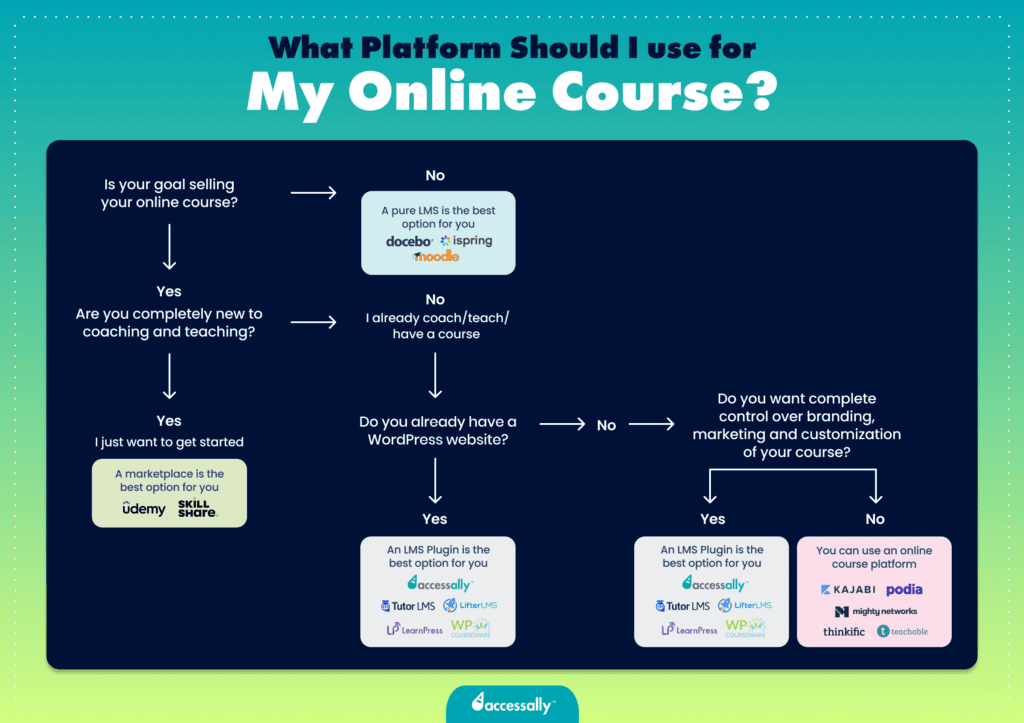

Why should I consider alternatives to Kajabi?
If Kajabi isn’t meeting your needs or you’ve outgrown it, you probably have reasons for wanting to switch.
Here are some common reasons why people search for alternatives to Kajabi:
Lack of integrations with other systems: Because Kajabi aims to be an all-in-one platform, it doesn’t integrate well with other tools. Relying solely on one system can be a weak point in your business. If that system fails, your whole setup does, too. But when you have multiple systems, if one fails, the rest stays unaffected.
Not open source: Kajabi’s code is not open source, meaning that you lose all of your content when you cancel your account. That’s why using a platform like WordPress to host your courses or manage memberships is much safer. You own your content and can see all the source code running your business. This way, you have complete control over everything.
Zero customization: Most course creators begin looking for a Kajabi alternative when it no longer allows them to grow. As they outgrow it, they begin to notice its limitations.
Because Kajabi is a hosted platform, you can’t do more than what the platform allows you to do, aside from waiting for them to release new features and expand their functionalities. This can often impact how you make money and manage your courses and members. Kajabi’s design options are limited because you have to work within its framework. This can be stifling for those who like custom designs and want to make their courses and membership area unique.
Limits on growth: Kajabi’s plans restrict the number of products, courses, and active members you can have, which can hold back your business from growing. For instance, if you want to give away a free course to people who join your email list, Kajabi limits you to 1,000 sign-ups on the $149/month plan or 10,000 sign-ups on the $199/month plan. This limit doesn’t work well for building your email list or turning free members into paying customers.
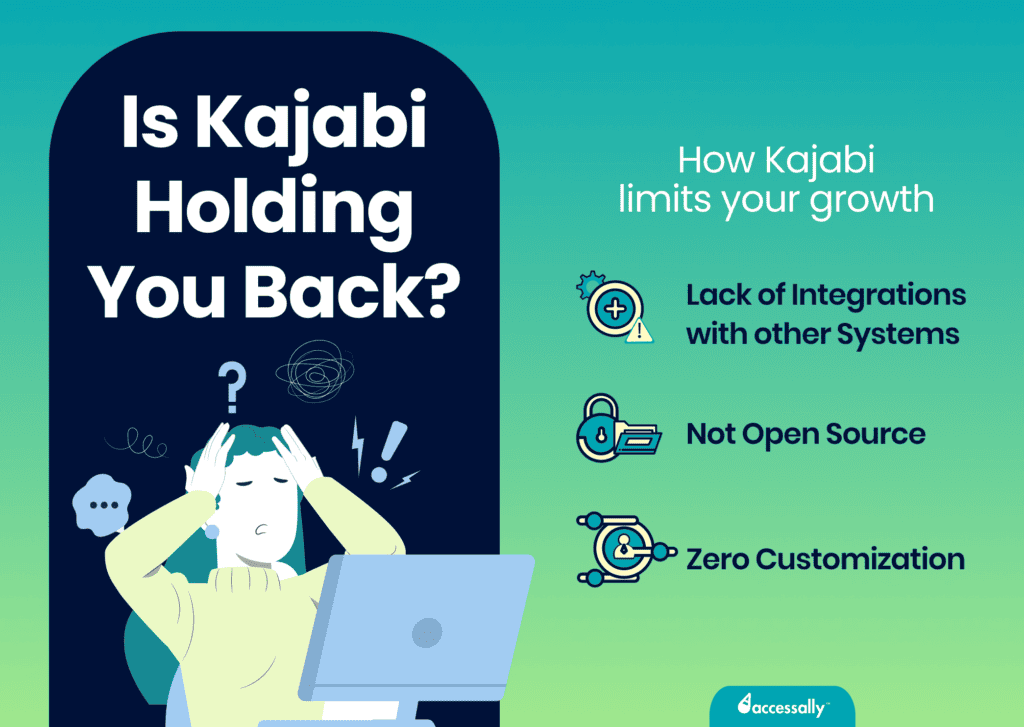

Kajabi Alternatives for Growing Online Courses
Although Kajabi is a great option for those course creators who don’t plan on growing their courses, those who do quickly find it limiting.
Many creators leave Kajabi when they begin to feel the need to customize their courses fully or when they decide to bring their online courses and community together in one place, which is something no standalone course platform can offer.
So, they end up switching to a self-hosted WordPress LMS plugin instead, which allows them to take full control of their courses and bring everything together in one place – their website.
Wondering which LMS plugin you should choose? Here’s a complete breakdown of the 6 most popular LMS plugins that are excellent alternatives to Kajabi.
1. AccessAlly
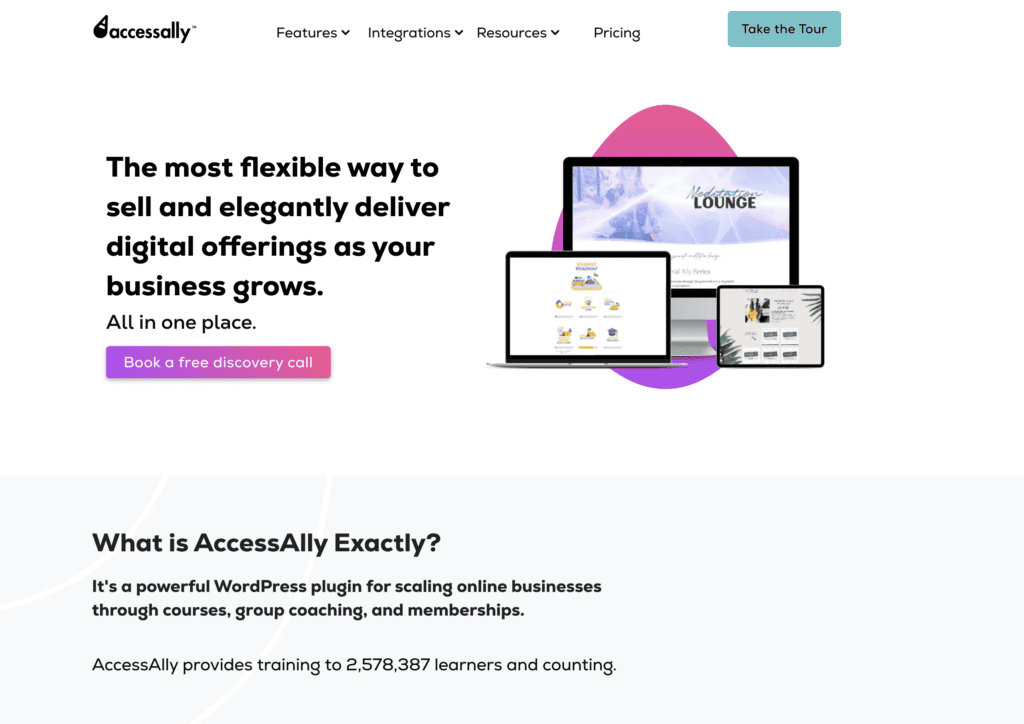

What Is AccessAlly?
Think of AccessAlly as an “out of the box” version of other LMS plugins. AccessAlly is the most modern LMS plugin you’ll find on the market.
Unlike other LMS plugins, AccessAlly provides its users with the full benefits of an LMS plugin without the need to install a ton of add-ons to achieve complete platform functionality.
Stacking add-ons is very common among other LMS plugins like LearnDash, and it can become a problem when too many add-ons start to create compatibility problems that can crush your site. And every time your course platform crashes or bugs, you lose money.
But if any problems do arise, AccessAlly has highly responsive and reliable customer support that can instantly help. Since AccessAlly doesn’t require you to install third-party add-ons, any issue you have with the platform can be addressed directly to AccessAlly’s support team. This means no back-and-forth finger-pointing between different providers.
So, as you can see, AccessAlly provides a smooth and seamless experience to course creators and their students. Because the platform is so modern and advanced in its functionalities, it’s easy to use, and the risk of tech issues is very low.
Who Should Use It
AccessAlly is the right option for those who want a straightforward solution for scaling their course without the hassle of dealing with tech issues or the need for multiple add-ons.
Pros & Cons
- Full control over course delivery
- Advanced customization options
- Seamless integration with WordPress
- All-in-one platform for course creation
- Support memberships and member directories
- Scalable with no per-student cost
- Community engagement features (CommunityAlly)
- No add-ons required
- Top-notch customer support
- Steep learning curve for beginners
- Initial setup takes time
Price
AccessAlly offers three subscription plans, starting at $82 USD per month (billed annually).
Reviews
Capterra Rating: 4.5/5
G2 Rating: 4.8/5
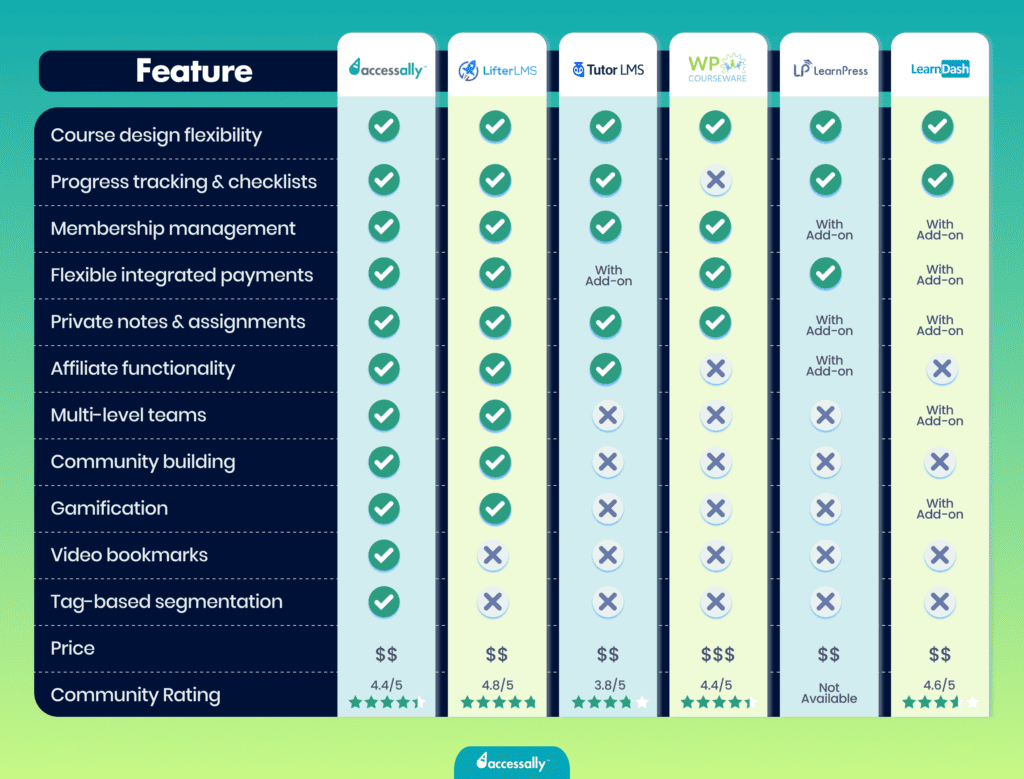

2. LearnDash
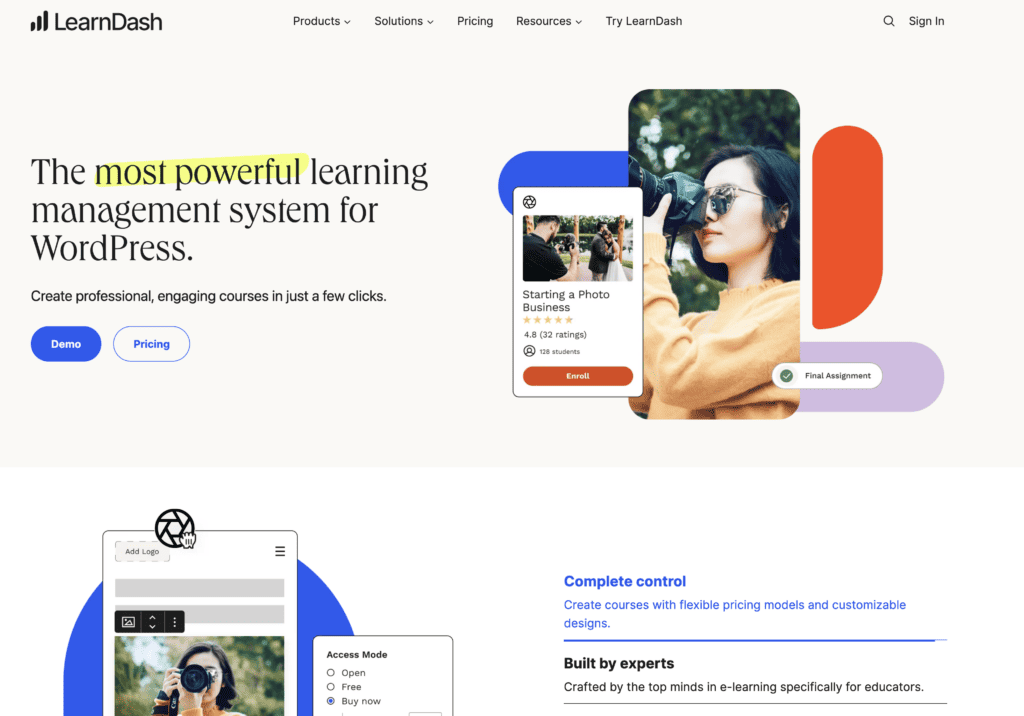

What Is LearnDash?
LearnDash is a popular choice for many course creators who want to self-host their courses on their WordPress websites. We don’t recommend it, however, as its interface is quite outdated and hardly user-friendly.
That’s mainly because LearnDash requires its users to install add-ons to achieve the full functionality of the LMS plugin. The issue is that these add-ons are created by third parties and don’t all necessarily work well together. So, stacking many different add-ons can lead to compatibility issues, site crashes, and bugs.
This sort of “add-on duct-taping” is why many creators find LearnDash very hard to use and quickly become frustrated with the platform.
Who Should Use It
We recommend steering clear of LearnDash. There are better alternatives out there that don’t require you to stack multiple add-ons on top of each. AccessAlly is a more modern and user-friendly version of LearnDash that provides users with a seamless, duct-taping-free experience.
Pros & Cons
- User-friendly and intuitive interface
- Easy to use for beginners
- Lightweight and robust LMS plugin for WordPress
- A seamless end-user experience in online learning
- Drag-and-drop course builder
- Interactive features like advanced quizzes and assignment management
- Some features are very complex
- The feature suite can be overwhelming for small creators
- Must install additional plugins for more customization
Price
LearnDash offers subscription plans starting at $199 USD per year for one site.
Reviews
Capterra Rating: 4.6/5
G2 Rating: 4.3/5
3. LifterLMS


What Is LifterLMS?
LifterLMS isn’t the best choice for course creators looking for a seamless experience. Like LearnDash, LifterLMS requires users to install third-party add-ons to unlock the platform’s full potential. Still, choosing LifterLMS over LearnDash makes more sense because it requires fewer add-ons than LearnDash.
But even if you can avoid installing too many add-ons, you’ll still need to install the key ones, such as payment integration with Stripe and PayPal, a Kit extension, and opt-in forms.
With LifterLMS, just like with LearnDash, you’re running the risk of compatibility issues between the different add-ons that can end up crashing your site.
Who Should Use It
LifterLMS is a decent choice for course creators aiming to scale their online courses on their website. Still, AccessAlly is much more modern and seamless than LifterLMS.
Pros & Cons
- The core LMS plugin is free
- It works well with any WordPress theme
- It comes with SkyPilot – a WordPress theme designed for e-learning experiences
- Transparent subscription-based pricing without hidden fees
- 30-day money-back guarantee
- Core differences between subscription plans may be confusing
- It may be complex to use for non-techie creators
- No community engagement features
- Most integrations are only available on the more expensive plans
Price
LifterLMS plans start at $199 USD per year, but there’s a freemium plan.
Reviews
Capterra Rating: 4.8/5
G2 Rating: 4.9/5
4. LearnPress
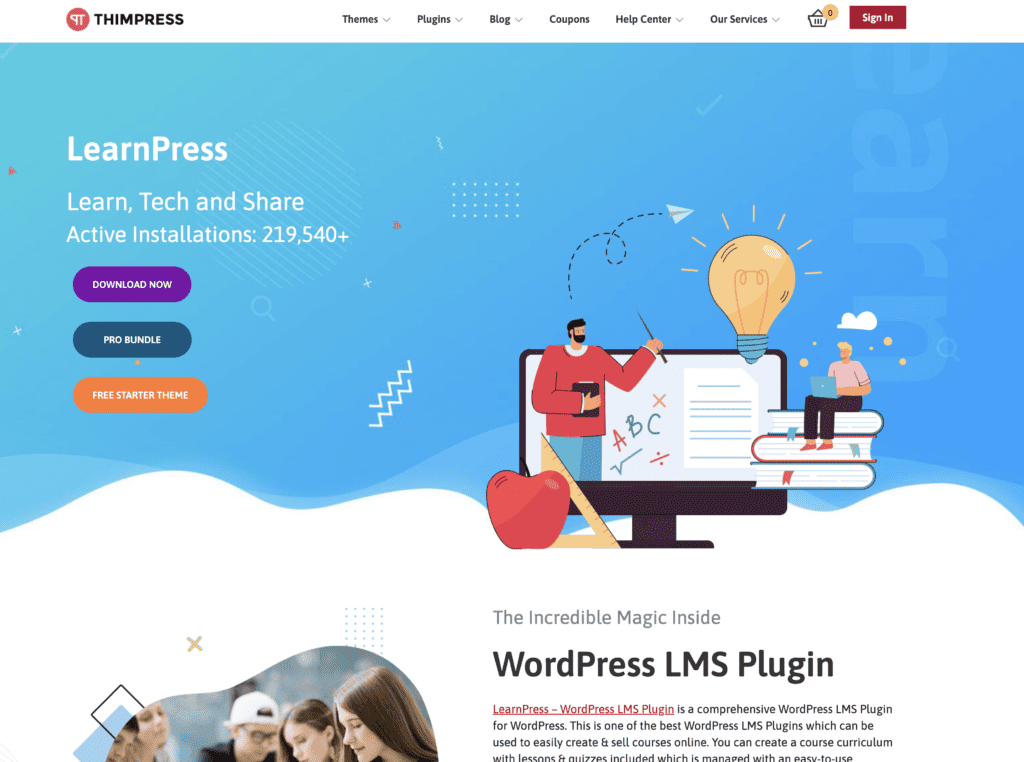

What Is LearnPress?
When you think of an LMS plugin to host courses on your WordPress website, LearnPress is likely the first option that pops into your head. LearnPress has been on the market for over 10 years, but that doesn’t make it the best.
In fact, LearnPress is extremely outdated and lacks many core functionalities that other LMS plugins provide. Because it’s so basic, LearnPress requires its users to install a ton of add-ons to make up for its lack of integrated functionalities. This makes the whole interface extremely clunky, full of bugs, and very slow.
Plus, LearnPress can be a nightmare to deal with because of how terrible its user interface is. To make matters worse, customer support isn’t great either, so when you experience an issue with your site (and you will), you’ll have to wait a long time to get it resolved (if at all).
Who Should Use It
We don’t recommend anyone to use LearnPress. As a course creator, you want to provide a seamless learning experience to your students. Being as outdated as it is, LearnPress will only hinder that experience.
Pros & Cons
- The core plugin is completely free
- Integrates well with all WordPress themes
- No need to integrate with WooCommerce, unlike other free LMS plugins
- It comes with its native WordPress theme
- Outdated and slow user interface
- Lacks some core functionalities
- Poor user experience, with frequent bugs
- Terrible customer support
- It’s free, but you must pay for add-ons
Price
LearnPress bundle with 28 add-ons costs $299 as a one-time payment. It also has a completely free starter theme.
Reviews
Capterra Rating: Not available
G2 Rating: Not available
5. WP Courseware
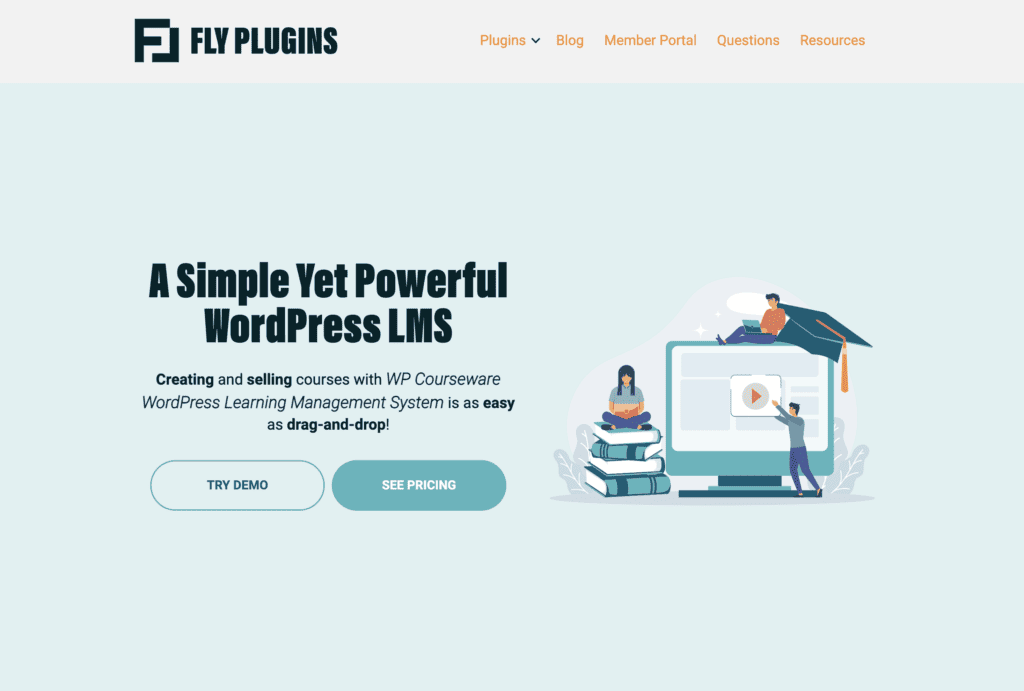

What Is WP Courseware?
While WP Courseware can be compared to LearnDash in terms of functionalities, it’s much more basic. Although the look and feel of WP Courseware can make it seem like the platform is pretty user-friendly, its backend is much clunkier and more outdated than LearnDash, and its admin interface can be slow and hardly intuitive to deal with.
Plus, WP Courseware doesn’t come with built-in membership features, so you’d have to pair it with something like MemberPress to unlock more capabilities. Because WP Courseware on its own is very weak in terms of user interface, MemberPress acts as the gatekeeper for your site.
Overall, WP Courseware + MemberPress is a weaker version of AccessAlly. It’s a combo that gets you the basics of what AccessAlly offers, but the trade-off is that being a combination, there’s room for potential errors and the classic finger-pointing scenario.
Who Should Use It
We don’t recommend using WP Courseware. Although the combination of WP Courseware and MemberPress can be enough for you if you’re looking for a basic platform to host your course, you’d be risking frequent bugs and tech issues on your site.
Pros & Cons
- Cost-effective compared to other LMS plugins
- Integrates directly with WooCommerce
- Payment processing features integrated into the plugin
- 30-day risk-free guarantee
- Outdated and slow user interface
- Poor user experience
- Frequent site bugs
- Lacks built-in membership features
- Non-responsive customer support
Price
WP Courseware subscription plans start at $159 per year for a two-site license.
Reviews
Capterra Rating: 4.4/5
G2 Rating: 3.3/5
6. Tutor LMS


What Is Tutor LMS?
Tutor LMS falls into the same boat as LearnPress and WP Courseware. The platform is clunky and outdated and requires users to stack multiple add-ons on top of each other to unlock the full functionality that an LMS plugin should offer at its core.
Because of this endless duct-taping, Tutor LMS can interfere with other elements of your site, causing compatibility “short circuits” that result in inexplicable bugs that can entirely disrupt the functionality of your site.
Overall, Tutor LMS seems to act like a misbehaved plugin that rebels against other elements of your site and decides to spread chaos in response.
Who Should Use It
Because of its need for stacking add-ons, buggy interface, and limited customization, we don’t recommend using Tutor LMS. Although it offers a free plan, it’s not worth the risk of having your entire site’s functionality disrupted.
Pros & Cons
- The core plugin is completely free
- Cost-effective subscription plans
- Supports all WordPress themes
- Quick setup process
- Easy to use
- Outdated and clunky user interface
- Can interfere with your site’s functionality
- Terrible customer support
Price
Tutor LMS’s subscription plans start at $199 per year for a one-site license. The core LMS plugin is free.
Reviews
Capterra Rating: 3.8/5
G2 Rating: 4.5/5


